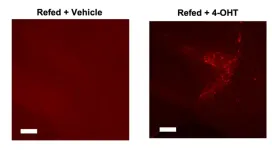(Press-News.org) In Rhode Island, USA, over one in four emergency department (ED) patients at high risk of overdose has a non-fatal opioid overdose in the 18 months post-discharge. A parallel, two-arm, randomized controlled trial conducted in Rhode Island of over 600 ED patients at high risk of opioid overdose found that support from a peer recovery support specialist (a trained support worker with lived experience of addiction) was as effective in reducing opioid overdose as support from a licensed clinical social worker. In other words, interviewing and intervention techniques informed by lived experience were as effective as those informed by social work theory and practice.
The standard form of support delivered by certified peer recovery support specialists is different from the standard form of support delivered by licensed clinical social workers, though both are evidence-based. Both forms of support use evidence-based interviewing and intervention techniques and provide patients with referrals for post-ED support. But certified peer recovery support specialists also provide ongoing support in the community for up to 90 days after ED discharge. That support focuses on helping the patient to overcome barriers to treatment and recovery, educating the patient in overdose prevention, and promoting the patient’s retention in treatment. Support from licensed clinical social workers typically ends when the patient leaves the ED.
This trial included 648 ED patients at high risk of opioid overdose, of whom 323 were randomized to receive support from a peer recovery support specialist and 325 from a licensed clinical social worker. Most participants (96.8%, n=627) completed the randomly assigned ED intervention. Within 18 months, 81 participants randomized to the peer recovery support specialist arm (25.1%) experienced a non-fatal opioid overdose compared with 95 who were randomized to the licensed clinical social worker arm (29.2%, p=0.24). The study also found no significant difference between the peer recovery support specialist arm and the licensed clinical social worker arm on fatal opioid overdoses.
Lead author Dr. Laura Chambers, from the Brown University School of Public Health, says: “Non-fatal opioid overdoses are an important predictor of future overdose death, so when someone presents at an emergency room with an overdose or a recent history of overdose, there is an opportunity to offer risk-reduction services to someone with a high risk of future overdose. Some emergency departments now use peer recovery support specialists to deliver some of those services, but we’re still finding out how well that works compared with more accepted sources of support. The results of our trial strongly suggest that trained peers, and the sort of sustained support they deliver, are just as effective at preventing opioid overdoses as the support offered by traditionally trained clinical social workers.”
-- Ends –
For editors:
This paper is available to read on the Wiley Online Library for one month after its publication (https://onlinelibrary.wiley.com/doi/10.1111/add.16581) or you may request a copy from Jean O’Reilly, Editorial Manager, Addiction, jean@addictionjournal.org.
To speak with lead author Dr Laura Chambers, please contact her at the Brown University School of Public Health by e-mail (laura_chambers@brown.edu). Dr Chambers is Lead Research Scientist in the Department of Epidemiology with the School of Public Health.
To speak with co-author Dr Brandon Marshall [12-15 July only], please contact him at the Brown University School of Public Health by e-mail (brandon_marshall@brown.edu). Dr Marshall is a professor in the Department of Epidemiology at the School of Public Health.
Full citation for article: Chambers LC, Li Y, Hallowell BD, Langdon KJ, Samuels EA, Mahoney LA, Beaudoin FL, and Marshall BDL. Effect of a peer-led emergency department behavioral intervention on non-fatal opioid overdose: 18-month outcome in the Navigator randomized controlled trial. Addiction. 2024. DOI: 10.1111/add.16581
Primary funding: The trial was funded by Arnold Ventures and the Cigna Foundation through investigator-initiated trial programs.
Declaration of interests: All authors declare that they have no conflicts of interest.
Addiction is a monthly international scientific journal publishing peer-reviewed research reports on alcohol, substances, tobacco, gambling, editorials, and other debate pieces. Owned by the Society for the Study of Addiction, it has been in continuous publication since 1884.
END
Trained peers are as effective as clinical social workers in reducing opioid overdose, new trial finds
2024-07-11
ELSE PRESS RELEASES FROM THIS DATE:
Study: Algorithms used by universities to predict student success may be racially biased
2024-07-11
Washington, July 11, 2024—Predictive algorithms commonly used by colleges and universities to determine whether students will be successful may be racially biased against Black and Hispanic students, according to new research published today in AERA Open, a peer-reviewed journal of the American Educational Research Association. The study—conducted by Denisa Gándara (University of Texas at Austin), Hadis Anahideh (University of Illinois Chicago), Matthew Ison (Northern Illinois University), and Lorenzo Picchiarini (University of Illinois Chicago)—found ...
Comprehensive evaluation of large language models in mining gene relations and pathway knowledge
2024-07-11
Understanding complex biological pathways, such as gene-gene interactions and gene regulatory networks, is crucial for exploring disease mechanisms and advancing drug development. However, manual literature curation of these pathways cannot keep pace with the exponential growth of discoveries. Large-scale language models (LLMs) trained on extensive text corpora contain rich biological information and can be leveraged as a biological knowledge graph for pathway curation.
Recently, Quantitative Biology published a study titled "A Comprehensive ...
Researchers pinpoint brain cells that delay first bite of food
2024-07-11
LA JOLLA, CA—Do you grab a fork and take a first bite of cake, or say no and walk away? Our motivation to eat is driven by a complex web of cells in the brain that use signals from within the body, as well as sensory information about the food in front of us, to determine our behaviors. Now, Scripps Research scientists have identified a group of neurons in a small and understudied region of the brain—the parasubthalamic nucleus (PSTN)—that controls when an animal decides to take a first bite of food.
In the study, published in Molecular Psychiatry on July 4, 2024, the team of scientists set out to selectively manipulate a group of PSTN cells that dial up their ...
With spin centers, quantum computing takes a step forward
2024-07-11
RIVERSIDE, Calif. -- Quantum computing, which uses the laws of quantum mechanics, can solve pressing problems in a broad range of fields, from medicine to machine learning, that are too complex for classical computers. Quantum simulators are devices made of interacting quantum units that can be programmed to simulate complex models of the physical world. Scientists can then obtain information about these models, and, by extension, about the real world, by varying the interactions in a controlled way and measuring the resulting behavior of the quantum simulators.
In a paper published in Physical Review B, a UC Riverside-led research team ...
Scientists release new research on planted mangroves’ ability to store carbon
2024-07-11
U.S. Forest Service ecologists and partners published new findings on how planted mangroves can store up to 70% of carbon stock to that found in intact stands after only 20 years.
Researchers have long known that mangroves are superstars of carbon absorption and storage. But until now, limited information existed on how long it took for carbon stored in planted mangroves to reach levels found in intact mangroves.
“About ten years ago, Sahadev Sharma, then with the Institute of Pacific Islands Forestry, and I discovered that 20-year-old mangrove plantations in Cambodia had carbon stocks comparable to those of intact forests,” ...
New immune cell therapy benefits laboratory models of ALS and has some positive results in an individual with the disease
2024-07-11
Immune system dysregulation and elevated inflammation contribute to the development of the fatal neurodegenerative condition amyotrophic lateral sclerosis (ALS), also known as Lou Gehrig's disease.
In new research published in The FASEB Journal, repeated infusions of certain immune cells delayed ALS onset and extended survival in mice, and also reduced markers of inflammation in an individual with the disease. The work was conducted by investigators at Massachusetts General Hospital, a founding member of the Mass General ...
Trial of cell-based therapy for high-risk lymphoma leads to FDA breakthrough designation
2024-07-11
CAR-T cell therapy, which targets a specific protein on the surface of cancer cells, causes tumors to shrink or disappear in about half of patients with large B-cell lymphoma who haven’t experienced improvement with chemotherapy treatments.
But if this CAR-T treatment fails, or the cancer returns yet again — as happens in approximately half of people — the prognosis is dire. The median survival time after relapse is about six months.
Now, a phase 1 clinical trial at Stanford Medicine ...
Major trial looks at most effective speech therapy for people with Parkinson’s disease
2024-07-11
A major clinical trial, led by experts at the University of Nottingham, has shown the Lee Silverman Voice Treatment (LSVT LOUD®) is more effective than the current speech and language therapy provided by the NHS, when treating patients with Parkinson’s disease (PD).
The results of the NIHR HTA funded trial, which are published today in the BMJ, showed that LSVT LOUD® was more effective at reducing the participant’s reported impact of voice problems than no speech and language therapy, as well as the NHS delivered speech and language therapy.
The trial was led by experts from the Universities of Nottingham and Birmingham, ...
Intensive voice treatment more effective than NHS speech therapy for Parkinson’s disease
2024-07-11
An intensive voice treatment developed in the USA and known as the Lee Silverman voice treatment (LSVT LOUD) is more effective than conventional NHS speech and language therapy or no therapy for people with Parkinson’s disease, finds a trial published in The BMJ today.
The researchers say the results emphasise the need to optimise the use of speech and language therapy resources for people with Parkinson’s disease.
Slurred or slow speech (known as dysarthria) is a common feature of Parkinson’s disease and can have a significant effect ...
NHS’s relentless focus on finance and productivity is failing patient safety
2024-07-11
“The NHS’s relentless focus on finance and productivity is failing patient safety,” argues patient safety commissioner Henrietta Hughes in an interview for The BMJ today.
“The patient’s anecdote is the canary in the coal mine,” she says. It’s the thing that tells us there’s something going wrong. But too often we hear about patients who have raised concerns being gaslighted, dismissed, and fobbed off.”
Hughes, a GP and former medical director at NHS England, became England’s first independent patient safety commissioner in September 2022.
The job was created ...



